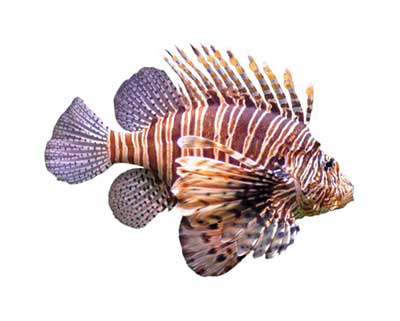Curbing the Lionfish Invasion: A Futile FightContents of this Issue: Sea Saba, Julianaís Hotel, Saba, Caribbean Get Your Kicks from Textured Iridescent Surfaces? Give Me a Break The Trials and Tribulations of Dive Travel Bahamasí Shark Mauls a Diverís Arm in Chumming Area Curbing the Lionfish Invasion: A Futile Fight The Equipment Insurers Side of the Story Why Amazing Corals Spawn Simultaneously Gabe Watson Did Not Kill His Wife Editorial Office: Ben Davison Publisher and Editor Undercurrent 3020 Bridgeway, Suite 102 Sausalito, CA 94965 from the August, 2011 issue of Undercurrent
Divers and dive resorts are well-intentioned when it comes to spearing lionfish in the Atlantic and Caribbean, but their efforts to eradicate them is equivalent to trying to eradicate the world's population of ants. Consider any Caribbean island. Miles and miles and miles of coastline and at best, a few dozen dive sites scattered hither and yon, usually only on the lee side. Good luck. Tragically, lionfish are causing big problems for plenty of other fish, including food fish like groupers and snappers. A new University of Florida study finds that lionfish reproduce too quickly to be wiped out by short-term harvesting, said Andrew Barbour, the study's lead author. So lionfish will likely continue gobbling up juvenile grouper, snapper and other economically important species, he said, unless better control strategies are found. Derbies have resulted in up to 1,400 lionfish being harvested in a day, but a single lionfish can produce as many as 200,000 eggs per month, easily replenishing the population's numbers.
Lionfish populations are able to rebound easily from harvesting efforts because they reach maturity quickly, have eggs and larvae that can be spread over large geographical areas by ocean currents, and thus far, have no natural predators to help keep them in check, said Tom Frazer, a UF professor of aquatic ecology and another author of the study. The UF scientists said it might be possible for those looking to dent the lionfish numbers to do so with intensive spearfishing in small geographic areas - such as coral reefs frequented by scuba diving tourists, Barbour said. But those efforts will have to be sustained. "You'd have to fish them hard, and over a long period of time," Frazer said. There are several theories about what caused lionfish to become established in the Western Hemisphere, Frazer said. Some blame irresponsible aquarium enthusiasts for simply releasing the fish into the wild. Others suggest wind and waves from Hurricane Andrew could have freed the fish from South Florida aquariums and swept them into the Atlantic Ocean. Another theory holds that the fish were accidentally transported in seawater used as ship ballast. From a story in the University of Florida News. The quoted study was published in May in the online journal PLoS ONE. |

I want to get all the stories! Tell me how I can become an Undercurrent Online Member and get online access to all the articles of Undercurrent as well as thousands of first hand reports on dive operations world-wide
| Home | Online Members Area | My Account |
Login
|
Join
|
| Travel Index |
Dive Resort & Liveaboard Reviews
|
Featured Reports
|
Recent
Issues
|
Back Issues
|
|
Dive Gear
Index
|
Health/Safety Index
|
Environment & Misc.
Index
|
Seasonal Planner
|
Blogs
|
Free Articles
|
Book Picks
|
News
|
|
Special Offers
|
RSS
|
FAQ
|
About Us
|
Contact Us
|
Links
|
3020 Bridgeway, Ste 102, Sausalito, Ca 94965
All rights reserved.

 The researchers used mathematical modeling programs to show that 35 to 65 percent of the lionfish would
have to be taken from an area every year to keep them in check. And that's not likely to happen,
said Mike Allen, a UF professor of fisheries ecology and one of the study's authors.
The researchers used mathematical modeling programs to show that 35 to 65 percent of the lionfish would
have to be taken from an area every year to keep them in check. And that's not likely to happen,
said Mike Allen, a UF professor of fisheries ecology and one of the study's authors.